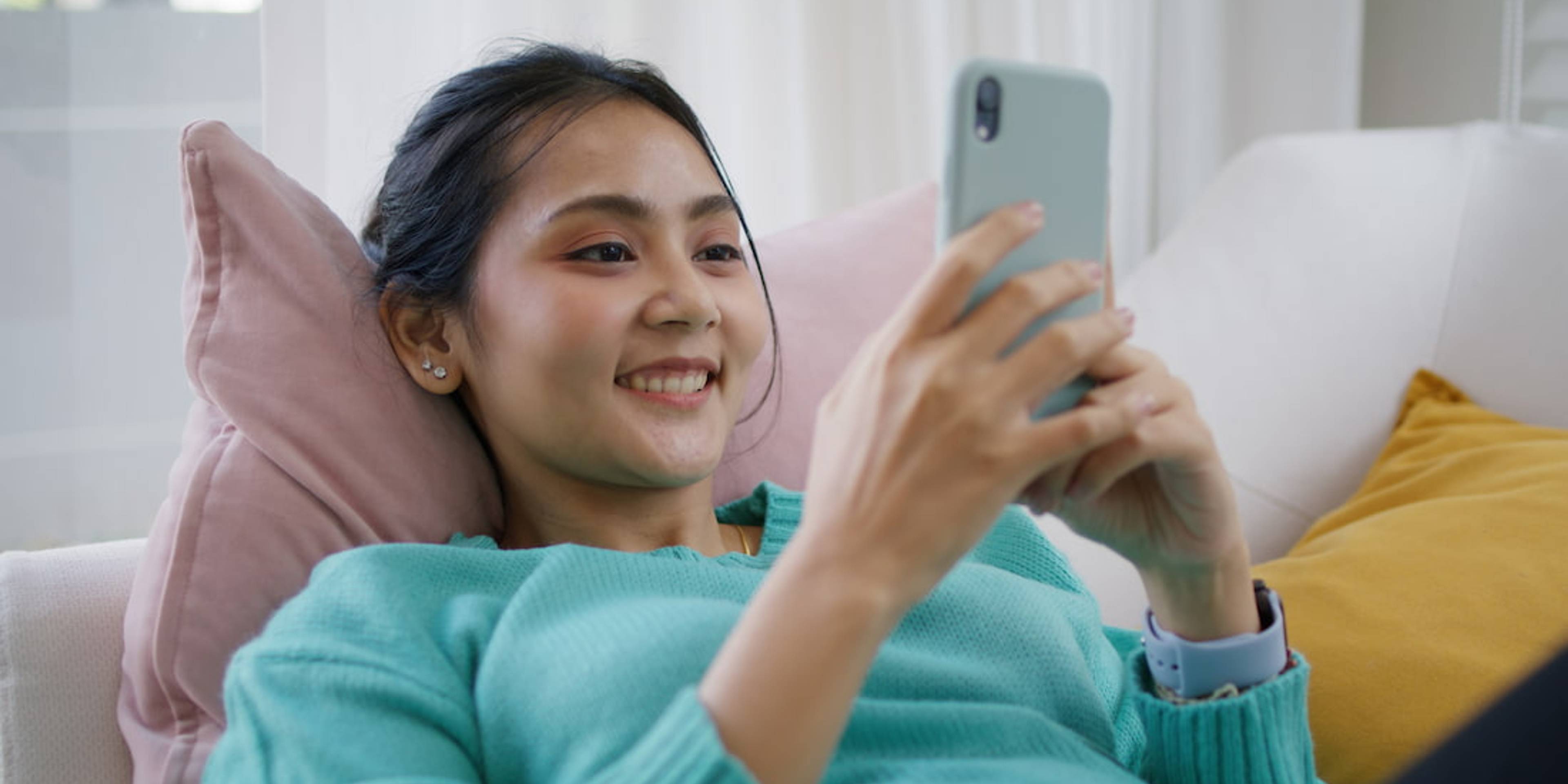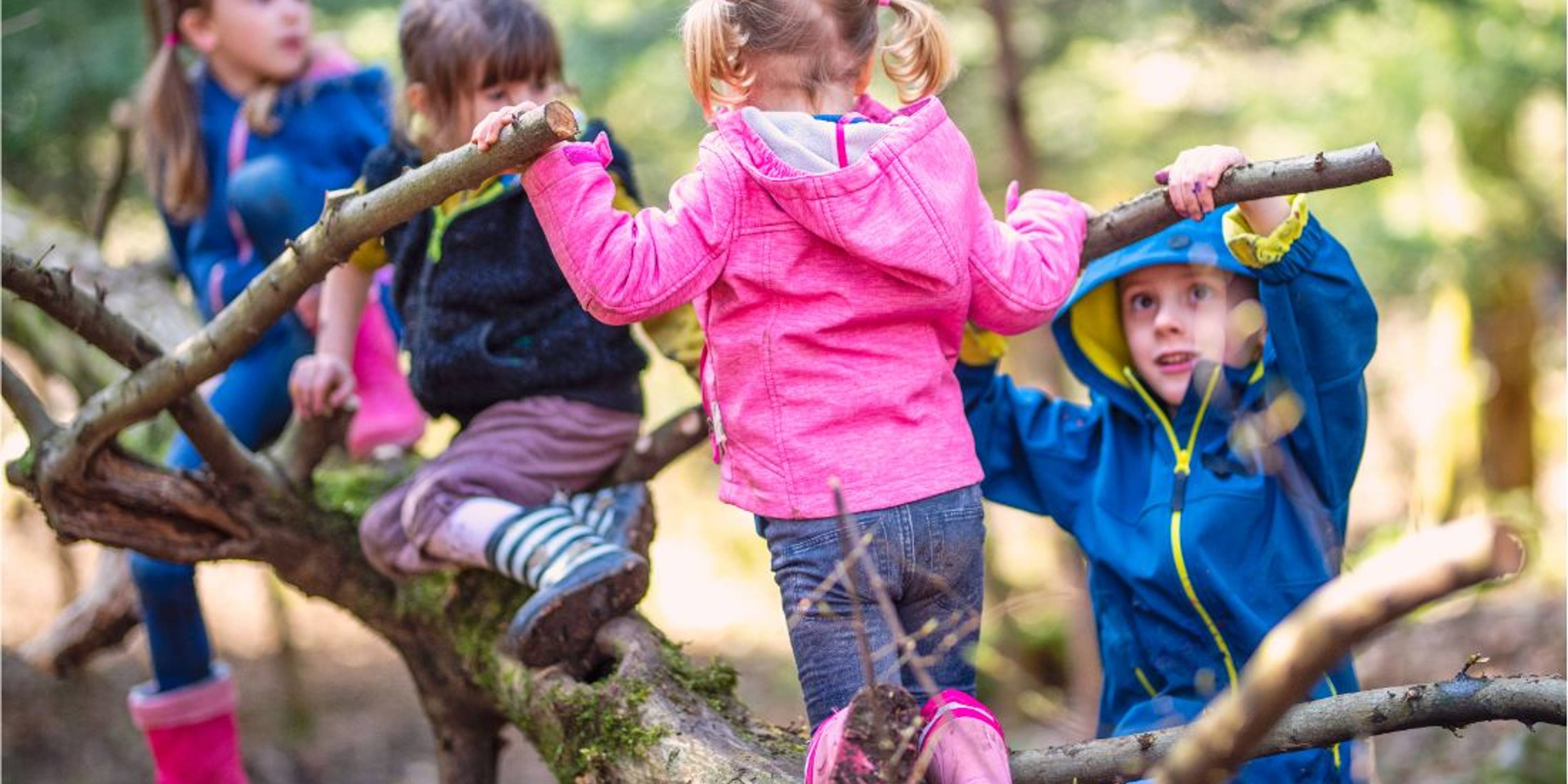December 17, 2024
Intrinsic reward and word learning

From infancy onwards, humans display an innate motivation to acquire language and to communicate. We start acquiring words as babies and continue to do so throughout our lives. In fact, children are thought to learn over 3000 new words each year. However, relatively little work has focused on why we are motivated to learn words, particularly when it comes to adolescents.
Adolescence is a period of great neurological change and sensitivity to learning. It's also marked by changes in reading behaviours. Whilst children become skilled readers between the ages of 10 and 18, this period is also associated with motivational changes in reading, with teens frequently showing a disinclination to read for pleasure. This change often coincides with the transition from primary to secondary school. Policy makers are keen to motivate adolescents to read for pleasure, arguing that it would improve not just literacy outcomes, but also result in substantial economic and societal benefit.
Recent research has shown that adults find learning words to be intrinsically rewarding, and that this intrinsic reward facilitates the entrance of new words into long-term memory. In their latest paper, our researchers of the month, Professor Saloni Krishnan and Professor Pablo Ripollés, set out to establish whether the same is true for children and teens.
Summary
So, what is intrinsic reward?
An extrinsic reward is external to us. We could be given money every time we do a particular thing, or we might feel good about ourselves when someone tells us “well done”. Extrinsic rewards are important and help to keep our levels of motivation high. In contrast, intrinsic rewards happen without external feedback.
For the majority of time when we are learning or doing something new, we don't receive external feedback. Yet something motivates us to keep learning. Why? Well, in our brains, there is a close relationship between our reward and memory systems. Dopamine is one of the most important neurotransmitters in the brain and it is released when we find something pleasurable or rewarding. When dopamine is released, it becomes easier for whatever we are doing to enter our long-term memory. In the case of learning, when we find a learning experience to be pleasurable, our reward network is activated, releasing dopamine, and this actually enhances our ability to learn and remember.
Studies have shown that when we learn on our own, and we are aware that we’ve learned something, this experience is intrinsically rewarding. And if the experience is intrinsically rewarding, and dopamine is released, we also end up learning it better.
What did the study show?
The research team asked 345 children and young people aged 10-18 to extract word meanings from sentences. Participants were presented with sentences which contained novel words. For example, they were given a nonsense word with no known meaning, such as "Kiche". They were then provided with a couple of sentences, such as, "Old people sometimes lose their kiche" and, "Mina has beautiful long kiche." They were asked to read the sentence, then type out the meaning of the word (which here, they might have deduced to be "hair"), before rating how much they enjoyed working out what it meant, how tired they were and how confident they were in the meaning that they ascribed to it. They did not receive any explicit feedback. The young people were also asked to recall word meanings the following day. This data was analysed to see whether adolescents show the same reward patterns as adults, and whether they experience the same 'buzz' during learning. As a control, in some of the sentences, it was not possible to extract any word meaning. In these examples, the ‘correct’ answer was to note that a meaning could not be ascribed.
The results showed clear evidence of an increase in pleasure during successful word learning, and that young people's experience of reward remained fairly stable across the age range of participants. Interestingly, a sense of enjoyment was only experienced when they were reading sentences where word meaning could be worked out, not upon completion of the control questions. It seems that reward systems in the brain were stimulated by the acquisition of tangible, new knowledge, rather than by the challenge of problem solving in and of itself.
So, what makes word learning intrinsically rewarding? Firstly, the experiment allowed participants to generate and test a prediction, something that is known to create optimal conditions for learning. Like adults, children and adolescents feel pleasure when successfully engaging internal learning processes. Professor Krishnan and Professor Ripollés note that this may be due to an increase in feelings of self-efficacy and confidence, and a reduction in feelings of uncertainty, when the young people felt that they had learned something. For learning experiences to be intrinsically rewarding, we need to feel sufficiently confident that we can learn or have learned.
Implications
"Word learning is pleasurable for children and adults. This is an important finding as it will ultimately allow us to develop strategies to drive engagement with language and reading, optimising learning experiences in childhood."
From a research perspective, we don’t yet know much about how to target intrinsic reward when it comes to language learning and so our researchers of the month will be investigating the practical implications of this study in the future. However, they do have some top tips which might help to boost children's sense of intrinsic reward when it comes to reading and word learning.
When reading with children, take time to stop and consider word meanings. Talking to children about what they think new words mean and helping develop their confidence in ascribing meanings to words can broaden their vocabulary and promote word learning.
Give children choice and a sense of agency. Providing variety and options when it comes to books, reading interventions and programmes is known to boost young people's sense of enjoyment and motivation.
Capitalise on their interests. Talking to children and young people about subjects that interest them can help to build new vocabulary, encourage them to make connections between words and may nudge them to build certainty and confidence around language within this specific domain. Foster things that they find rewarding. As a general rule, we tend to be very good at doing this with younger children, but frequently less so as they get older. Keep going!
Model an enjoyment of reading and word learning. Signal when you learn a new words. Be explicit about it!
Talk about the nuances of words. Building a wide ranging vocabulary around emotions and experiences can help to cultivate empathy and a greater capacity to navigate social and emotional challenges.

Professor Saloni Krishnan and Professor Pablo Ripollés
Professor Krishnan is Associate Professor in Developmental Language Sciences at University College London and Professor Ripollés is Assistant Professor of Psychology at New York University
Professor Saloni Krishnan is a developmental cognitive neuroscientist and her research focuses on understanding childhood communication disorders, such as DLD (developmental language disorder) and dyslexia. She has been awarded funding from the Academy of Medical Sciences, the MRC and the ESRC to support my research. With her MRC New Investigator grant, she is leading a team focusing on investigating the links between motivation and language learning in neurodivergent children. She has won several prizes for my research, including the Neil O’Connor Award from the British Psychological Society and the NDAS Mid-Career Prize. She was named a Rising Star by the Association of Psychological Sciences in 2022. Her research has featured on the BBC, the Guardian, Daily Mail, and the Boston Globe.
Professor Pablo Ripollés is an Assistant Professor with a joint position between the Department of Psychology and the Music and Audio Research Laboratory (MARL) at New York University. He has served as MARL's associate director since September 2020. He received a B.M. in Computer Engineering from University of València (2009), an MSc in Biomedical Engineering from the University of Navarra (2011), and a PhD in Biomedicine from the University of Barcelona (2016). His research focuses on building bridges between different fields of cognitive neurosciences - especially reward - and other areas of study, including music, technology, and language. His work also goes beyond basic research and includes applied scientific studies that capitalise on music to improve human health and wellbeing.
Professor Saloni Krishnan and Professor Pablo Ripollés
Professor Krishnan is Associate Professor in Developmental Language Sciences at University College London and Professor Ripollés is Assistant Professor of Psychology at New York University
Scroll our research gallery

Jan 19, 2026
The power of reading: books, vocabulary and learning
Did you know that 2026 is the UK’s National Year of Reading? This long-overdue initiative reflects growing concern and renewed commitment around children’s reading and literacy. As Dr Maria Korochkina, our latest Researcher of the Month, puts it: “The ability to read opens up worlds. Reading enables children to progress into post-primary education and provides the basis for lifelong learning and prosperity into adulthood”. Frequent readers tend to have a stronger understanding of both their own and others’ emotions. They are often better able to communicate these emotions, a skill linked to higher emotional intelligence and improved mental wellbeing. Reading also encourages cause-and-effect reasoning and helps children imagine scenarios beyond the immediate moment - developing the skill of -future-thinking'. A rich vocabulary underpins learning across the school curriculum, strengthens thinking and communication skills, and predicts both academic attainment and later life outcomes. Research consistently shows that the most effective way to build vocabulary is through reading. However, learning to read well is not quick or effortless. The journey to skilled reading typically spans around ten years, requiring high-quality classroom instruction alongside sustained practice through independent reading. For many children, this process is painstaking, demanding consistent teaching, encouragement and opportunity over time. Against this backdrop, recent evidence presents a worrying picture. Fewer children are reading for pleasure than ever before. In 2024, only one in three UK children and young people aged eight to 18 reported enjoying reading in their free time. Even more strikingly, just one in five said they read daily for pleasure, the lowest level recorded since the National Literacy Trust began collecting this data in 2005. This matters because reading ability and reading enjoyment are deeply intertwined. Children who find reading effortful are far less likely to choose to read independently. Dr Korochkina’s research highlights how early reading experiences shape later habits: difficulties with phonic and morphological knowledge in the early stages of reading acquisition can have a snowball effect, reducing confidence, fluency and motivation over time. Her work also offers a powerful note of optimism. Books that children actively choose to read, including contemporary, popular texts, provide rich opportunities to develop vocabulary, particularly when children read widely. Ensuring access to a diverse range of engaging reading material, alongside strong early instruction, can play a vital role in building both reading skill and reading motivation. Fostering confident, motivated readers requires long-term commitment. It is not enough for children simply to have books available to them. They need skilled teaching, time, practice and a culture that values reading as both a skill and a pleasure.

Dec 15, 2025
Crossing the line into cybercrime
As the most digitally connected generation so far, young people today face new challenges. Our latest Researchers of the Month, Professor Davidson and Dr Farr, have found that in the last decade, an increasing number of young people (particularly young men) have committed serious cybercrime offences, particularly hacking and money laundering. Their new book, written following a large research project funded by the European Union’s Horizon 2020 research and innovation programme, seeks to understand the drivers behind this trend. It explores a range of potential factors that may lead young people to engage in risky online behaviours, and to identify effective pathways for prevention.

Nov 16, 2025
Supporting Children’s Use of AI
Children and young people are now growing up surrounded by AI, and the landscape is shifting fast. In the UK, recent data from Ofcom and Internet Matters suggests that around half of children aged 8–17 regularly use generative AI tools such as ChatGPT, Bard or Snapchat’s MyAI. Many describe these interactions as feeling like conversations with a friend. A recent report from Common Sense Media found that 33% of teens had actually chosen to talk to an AI companion instead of a real person about something important or serious. Whether children are asking voice assistants to answer their questions, relying on chatbots for bedtime stories, using learning apps for revision or engaging with large generative AI models, it’s essential to remember that most of these systems were built with adults in mind, not children. They often assume levels of attention, memory and emotional maturity that younger users simply don’t have. Even older children and teenagers, who increasingly use AI as a supportive confidante (often without adult supervision or knowledge), are still learning to navigate boundaries around trust, identity and emotion. Our latest Researcher of the Month, Dr Nomisha Kurian, wants this to change. She has developed a new framework called Developmentally Aligned Design (DAD), which outlines how AI can be built with children’s needs, vulnerabilities and strengths at its core. She also chatted to us at Tooled Up, sharing practical tips on recognising when children may be relying too heavily on AI for emotional connection, how to talk to them about healthy boundaries, and how parents and educators can help children and young people use AI tools safely, creatively and critically.

Oct 16, 2025
Algorithmised Girlhood: Teenage Girls and TikTok
As part of the early stages of her PhD study, our latest researcher of the month, Chiara Fehr, ran several focus groups about experiences of TikTok with eight 17 year old girls. Using creative methods, such as ‘TikTok show and tells’ a collaging session and a utopic mapping exercise, Chiara is exploring whether dominant narratives around growing up in a digitised world reflect the real life experiences of teens, and has summarised her findings so far in a recent article.
![“[They use devices] alllllllll day long”. What do children think about our tech use?](https://cdn.sanity.io/images/jxfh43in/content-prod-d2c/79f219275088655f59590f61ff29b6bc8b0d77f8-1100x733.jpg?w=3840&h=1920&q=70&fit=crop&crop=center&auto=format)
Sep 09, 2025
“[They use devices] alllllllll day long”. What do children think about our tech use?
We're all used to reading about children and young people's increasing use of digital tech. But what about adults' use? And what impact might our tech use have on family life? Parents today are spending an unprecedented amount of time on their devices. One study found that parents spend an average of nine hours per day engaged with screen devices. Over four hours of this is on smartphones, averaging 67 phone checks per day. Despite children's central role in family life, their voices and perspectives on the device use of the adults around them have been largely neglected in research. Along with colleagues, our latest Researcher of the Month, Professor Cara Swit, has published a fascinating study exploring the experiences and perceptions of children aged six to nine about their parents’ device use at home and its impact on them.

Aug 13, 2025
Students’ views on smartphone bans
In recent years, banning or restricting children’s access to smartphones and social media has grasped the attention of policy makers, schools and parents. A number of countries, including France, Turkey, Norway, Sweden, and regions of the US and Canada have introduced laws, policies or guidance for schools to ‘ban’ or heavily restrict the use of phones. Within Ireland, in 2024, the Minister for Education announced her intention to introduce smartphone bans in post-primary schools, whilst at the same time acknowledging that individual schools are best placed to decide on the scope and scale of restrictions for their students. Whilst these bans aim to protect children from harm, and teachers often anecdotally report seeing benefits, evaluations of existing research highlight a lack of evidence on their efficacy. At the moment, we simply don't know enough about the impact of bans. Evidence is hampered by the fact that technological developments and technology use is moving at a faster pace than research. Some studies suggest that bans are beneficial to academic outcomes and mental wellbeing. Others suggest no effects. However, many studies have methodological weaknesses, use small samples or retrospective data, and can't ascribe causal mechanisms. Our latest Researcher of the Month, Dr Megan Reynolds, has recently published a paper which explores young people's perspectives and experiences of smartphone bans in their schools. Unlike most previous research, it centres student voices in this high profile issue.

Jul 14, 2025
Do teens with mental health conditions use social media differently than their peers?
As Luisa Fassi, our new Researcher of the Month, comments, "The link between social media use and youth mental health is hotly debated, but hardly any studies look at young people already struggling with clinical-level mental health symptoms". In fact, Luisa's large systematic review and meta-analysis found that only 11% of papers published on the topic since 2007 focused on young people with clinical conditions. Her review also showed that the data used to evidence mental health conditions in these existing studies is not always strong or especially robust. Many report links between social media and mental health on the basis of short self-report questionnaires, where young people are asked about symptoms. Whilst this wasn't found as part of Luisa's review, it is also the case that very few papers in the field differentiate between different mental health conditions, or examine different symptoms or conditions (such as anxiety, ADHD or eating disorders) in isolation. To address this research gap, Luisa and colleagues have recently published a fascinating and nuanced paper. It analyses both quantitative and qualitative dimensions of social media use from a nationally representative survey of 3,340 teens in the UK aged between 11 and 19 years old, which was conducted by NHS Digital in 2017. Rather than gathering mental health data from self-report questionnaires, the young people in the survey underwent a full clinical screening, which included interviews with the young people, their parents and teachers. Information about social media use came from questionnaires completed by participants. They were not asked about specific platforms. Luisa used this data to gather novel insights into how social media and mental health are related in teens who both meet and do not meet diagnostic criteria for a wide range of mental health conditions. The study does not establish any causal links, but it does reveals a range of differences between young people with and without mental health conditions when it comes to social media.

Jun 17, 2025
Navigating the feed: younger adolescents' reflections on algorithmically curated social media
Our latest researcher of the month, Roxana Pomplun, has investigated the interactions, experiences and perceptions of younger adolescents, aged 11, 12, and 13, with algorithmically curated platforms such as TikTok, YouTube Shorts, Spotlight on Snapchat and Reels on Instagram. These kinds of platforms use algorithms to personalise and tailor feeds, harnessing user data to suggest content that the individual is most likely to be interested in and engage with. As such, young people have little control over what they are seeing in their feeds. Tech companies are not yet required to be transparent about the data that they are collecting, but it tends to include demographic information such as age, gender or location, along with use patterns. Whilst these sites dominate the digital lives of tweens and teens, until now they have received little dedicated research attention, particularly in relation to younger users, with most existing studies focusing on older teens. Whilst we know that most social media platforms have age limits of 13, we also know that many younger children are active users, particularly of algorithmically curated platforms like TikTok and YouTube Shorts. Given that early adolescence is a life phase marked by critical neurological development, identity development and heightened susceptibility to mental health issues, deepening our understanding of how younger adolescents engage with social media is vital. Roxana's qualitative research, where a group of young people eloquently explore their own experiences and perceptions, broadens our knowledge of social media use within an age group that appears increasingly aware of the digital influences shaping their online experiences, yet which is still in need of support to fully navigate these ecosystems.

May 15, 2025
Looking beyond smartphone bans
Over the last year or so, there has been a surge in public concern around smartphones and social media. Banning or restricting children’s access to smartphones and social media has grasped the attention of policy makers, schools and parents. A number of countries, including France, Turkey, Norway, Sweden, and regions of the US and Canada have introduced laws, policies or guidance for schools to ‘ban’ or heavily restrict the use of phones. In the UK, there are proposals to raise the age of ‘internet adulthood’ from 13 to 16, and to ban smartphones in schools. The third reading of a private members’ bill on this topic will be heard in parliament in July. Whilst these bans aim to protect children from harm, recent studies highlight a lack of evidence on their efficacy. Along with a team of international experts, our latest Researcher of the Month, Professor Victoria Goodyear, argues that, in isolation, banning smartphone and social media access fails to equip children for healthy use of technology. She suggests that there is a need to shift debates, policies and practices away from a sole focus on restricting smartphone and social media access, toward an emphasis on nurturing children’s digital skills for healthy technology use, and a rights-respecting approach which is underpinned by age-appropriate design and education.

Apr 22, 2025
Encouraging adventurous play in the preschool years
Tune into our podcast interview with April's researchers of the month here. As well as providing numerous opportunities for exploration, joy, and expression, outdoor and adventurous play - the type of play that allows children to take age-appropriate risks - is associated with a range of positive health behaviours and outcomes. Yes, we're talking about the kind of play that might leave us adults with our hearts in our mouths at times, as children start to disappear up a tree, or engage in a rough and tumble game of chase. But its benefits are wide-ranging and known impacts include increased levels of habitual physical activity alongside better mental health and positive mood. In 2019, Dr Hesketh was involved in the creation of physical activity guidelines in the UK, which explicitly note the importance of outdoor play for children in the preschool age group. We know quite a lot about the play habits of school-aged children, but until now, have had significantly less data on their younger counterparts. Our Researchers of the Month, Dr Kathryn Hesketh and Professor Helen Dodd set out to discover how much time preschool-aged children spend playing in a range of indoor and outdoor spaces, and how adventurously they are playing within them. In the first national survey of play in children of this age, they asked over 1000 parents of two to four year olds about their children’s play habits, finding that, on average, children aged two to four spend around four hours per day (outside of educational settings) playing. Just under 50% of this was spent playing outdoors. Their findings shed interesting light on some inequalities in play, even in the youngest age group, which may exacerbate existing inequalities in health.

